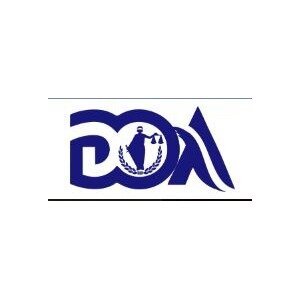Best Restructuring & Insolvency Lawyers in Ikoyi
Share your needs with us, get contacted by law firms.
Free. Takes 2 min.
List of the best lawyers in Ikoyi, Nigeria
About Restructuring & Insolvency Law in Ikoyi, Nigeria
Restructuring and insolvency law deals with situations where a business or individual is facing financial difficulty, struggling to pay debts, or is already unable to meet financial obligations. In Ikoyi, Lagos State's prominent commercial hub, restructuring and insolvency cases are common due to the area's concentration of corporate headquarters, businesses, and financial institutions. The law provides clear processes for managing debt, protecting creditor and debtor rights, and ensuring business continuity where possible. The main goal is to help businesses reorganize, restructure, or, if necessary, liquidate assets in an orderly manner so that claims and obligations can be managed fairly.
Why You May Need a Lawyer
Restructuring and insolvency cases are complex and often stressful, involving significant financial, legal, and sometimes, criminal consequences. You may require the expertise of a restructuring and insolvency lawyer in the following circumstances:
- You or your business are struggling to pay debts as they fall due
- Your company receives a statutory demand or winding-up petition
- You have received notice of an insolvency proceeding, such as receivership or administration
- You want to reorganize company finances, operations, or ownership structure to avoid insolvency
- You are a creditor seeking to recover debts owed by a financially distressed business
- You face allegations of wrongful trading or director misconduct related to insolvency
- You need guidance on personal insolvency or bankruptcy options
- You wish to buy assets from a distressed business or invest in a restructuring process
A lawyer can advocate for your interests, navigate legal procedures, communicate with creditors and courts, and ensure you comply with Nigeria's intricate insolvency laws.
Local Laws Overview
The legal framework for restructuring and insolvency in Ikoyi, as in the rest of Nigeria, is principally governed by the Companies and Allied Matters Act (CAMA) 2020 and the Bankruptcy Act. Key aspects of these laws relevant to Ikoyi include:
- Receivership, Administration, and Liquidation: Legal mechanisms for formally addressing the affairs of a financially distressed company. Each process has distinct rules for the appointment of receivers or administrators, and for asset distribution.
- Voluntary Arrangements: Companies or individuals may make proposals to creditors for repayment over time, subject to creditor approval and court sanction.
- Creditor and Debtor Rights: Laws set out rights for both creditors (to recover debts via court processes, security enforcement, etc.) and debtors (protection from certain legal actions, right to propose restructuring, etc.).
- Director Obligations: The law places rigorous duties on directors in the period leading up to and during insolvency and holds them accountable for wrongful or fraudulent trading.
- Individual Bankruptcy: Processes for declaring individuals bankrupt, managing their property, and eventually discharging the bankruptcy following legal requirements.
- Court Proceedings: Ikoyi falls under the jurisdiction of the Federal High Court, Lagos Division, which handles most corporate insolvency and restructuring matters.
Strict procedural rules and timelines apply, with oversight provided by regulatory authorities such as the Corporate Affairs Commission (CAC).
Frequently Asked Questions
What is the difference between restructuring and insolvency?
Restructuring refers to legal and financial strategies aimed at reorganizing a business to improve its ability to meet obligations and continue operations. Insolvency occurs when an individual or company cannot pay debts as they fall due. Insolvency may lead to restructuring, or, if restructuring fails, formal insolvency proceedings such as liquidation.
Can I keep my business running during restructuring?
Yes, in many situations the aim of restructuring is to keep the business operational while debts and obligations are reorganized. Legal protection may be granted by the court to shield the business from creditor actions during this period.
What happens to company directors during insolvency?
Company directors must act in the best interest of creditors and avoid wrongful conduct. Directors may be investigated for wrongful or fraudulent trading. If found liable, they could face disqualification or personal financial responsibility.
What are the main types of insolvency proceedings in Nigeria?
The main types include receivership, administration, liquidation (winding up), and individual bankruptcy. Each type has specific eligibility, processes, and legal implications.
How long does an insolvency process take?
The timeline varies depending on the process involved. Simple liquidations might take several months, while complex restructurings can extend over a year or more, depending on negotiations and court schedules.
Do I lose all my assets if I am declared bankrupt?
Not necessarily. Certain personal items and necessities may be exempt. However, most assets could be sold to pay off creditors. After legal discharge, you are released from most remaining debts.
Can creditors challenge a restructuring plan?
Yes, creditors have the right to object to restructuring plans. Court approval is usually required to ensure that terms are fair and all interests are considered.
Is out-of-court settlement possible in insolvency cases?
Yes, out-of-court settlements and negotiations with creditors are encouraged and often successful in resolving financial distress without formal court involvement, especially in voluntary arrangements.
What is the role of the Corporate Affairs Commission in insolvency?
The CAC oversees company registration, regulatory compliance, and maintains records of liquidation and restructuring proceedings. They ensure legal processes are properly followed.
Should I consult a lawyer even for minor debt issues?
It is wise to consult a lawyer early, even for minor debt issues. Prompt legal advice can help prevent escalation and may offer options to resolve matters before they become critical.
Additional Resources
Several resources and organizations can help those dealing with restructuring and insolvency in Ikoyi, Nigeria:
- Corporate Affairs Commission (CAC) in Lagos - for company records and regulatory matters
- Federal High Court, Lagos Division - handles insolvency and liquidation cases
- Lagos State Ministry of Justice - provides information on legal rights and referrals
- Nigerian Bar Association (NBA) Lagos Branch - for referrals to qualified legal practitioners
- Insolvency professional firms and forensic accountants specializing in distress situations
- Chambers of Commerce and business advisory centers in Lagos
Next Steps
If you or your business is facing potential restructuring or insolvency in Ikoyi, it is crucial to act promptly. Here are practical steps to take:
- Gather all relevant financial and legal documents, including contracts, debt schedules, and correspondence with creditors
- Seek advice from a qualified restructuring and insolvency lawyer based in Ikoyi or nearby Lagos
- Discuss your objectives and concerns openly so your lawyer can advise on available options
- Engage early with creditors and other stakeholders, possibly with your lawyer’s assistance, to explore amicable solutions
- Follow through with any agreed legal or financial restructuring processes, adhering to the law's requirements for disclosure and cooperation
Getting timely and competent legal advice can make the difference between business recovery and financial loss. Lawyers in Ikoyi are well placed to guide you through the local laws and procedures to achieve the best possible outcome.
Lawzana helps you find the best lawyers and law firms in Ikoyi through a curated and pre-screened list of qualified legal professionals. Our platform offers rankings and detailed profiles of attorneys and law firms, allowing you to compare based on practice areas, including Restructuring & Insolvency, experience, and client feedback.
Each profile includes a description of the firm's areas of practice, client reviews, team members and partners, year of establishment, spoken languages, office locations, contact information, social media presence, and any published articles or resources. Most firms on our platform speak English and are experienced in both local and international legal matters.
Get a quote from top-rated law firms in Ikoyi, Nigeria — quickly, securely, and without unnecessary hassle.
Disclaimer:
The information provided on this page is for general informational purposes only and does not constitute legal advice. While we strive to ensure the accuracy and relevance of the content, legal information may change over time, and interpretations of the law can vary. You should always consult with a qualified legal professional for advice specific to your situation.
We disclaim all liability for actions taken or not taken based on the content of this page. If you believe any information is incorrect or outdated, please contact us, and we will review and update it where appropriate.










